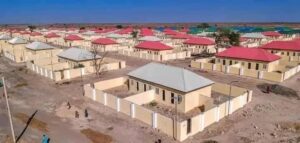Why low income earners cannot own homes in Nigeria — Stakeholder
By Owoleye Oluwakayode
Millions of Nigeria’s low income earners have waited several years to get mortgage loans to buy a house. They have been saving under the government mandatory mortgage scheme to help workers purchase low cost homes.
These Nigerians whose dreams of owning a good house is fading, because they have not been able to access mortgage loans, coupled with the fact that cost of getting a house in Nigeria is too expensive due to skyrocketing cost of building materials.
Because of low return on patronage of low income houses, more and more investors are focusing on building homes which only the rich and upper middle class are ready to spend more. Since Nigeria emerged from recession more than two years ago, the demand for premium houses has been on the rise. Nigeria needs 20 million new homes to Carter for families who need them. The World Bank estimates that would cost $400 billion.
The investment potentials of the sector are enormous, but for now only a fraction of the amount required is being invested. In Nigeria the power and control of land is vested in the government. Experts say unless land becomes affordable more Nigerians will be condemned to living in slums or substandard homes.
Managing Director of Property Crew, Christiana Kanu believes that majority of the houses in Nigeria are quite overpriced. She said that houses in major urban cities of Lagos, Abuja, and Port Harcourt are put up at outrageous prices, thereby making it almost impossible for even the middle-income earners to access.
“The continuous fall in naira is also a major challenge in housing. This is because the Nigerian construction industry depends mostly on the importation of raw materials and equipment used for construction. With unstable naira, the cost of purchasing these raw materials increases and so the market bears the brunt.
“We need to produce materials locally so that properties would be more affordable and also the economy would be boosted.
“The structural process of registering properties in Nigeria is also one of the main challenges of housing in Nigeria.
“In Nigeria, people whose income is below N1.2 million per annum are classified as low income earners. National minimum wage in the country today stands at N30,000 per month. That wage cannot, technically speaking, be called national because many states of the federation are unable to pay.
“This means that all civil servants who earn minimum wage are automatically excluded from mortgage loan even if the interest rate is as low as 6 percent which is the lowest interest rate only offered in the country by the National Housing Fund (NHF).
“Based on the terms of mortgage structuring which requires repayment of not less than one third or 33.3 percent of a monthly income, a borrower on N30,000 per month has to deduct approximately N10,000 for loan repayment, and a monthly payment of this sum for 30 years, as required by law, will mean that the prospective home owner will contribute only N3 million for the 30-year period.
“However, apart from the fact that there is no decent accommodation for N3 million in a good location, there is also no 30-year mortgage available for loan applicants. Besides, given that minimum wage remains N18,000 for some workers, 33.3 percent of N18, 000 will be N5, 994 and a monthly payment of this sum over 30 years period will amount to only N2.15 million.
“Many households cannot own homes through mortgage because, given their low per capita income, they won’t qualify for mortgage.”




